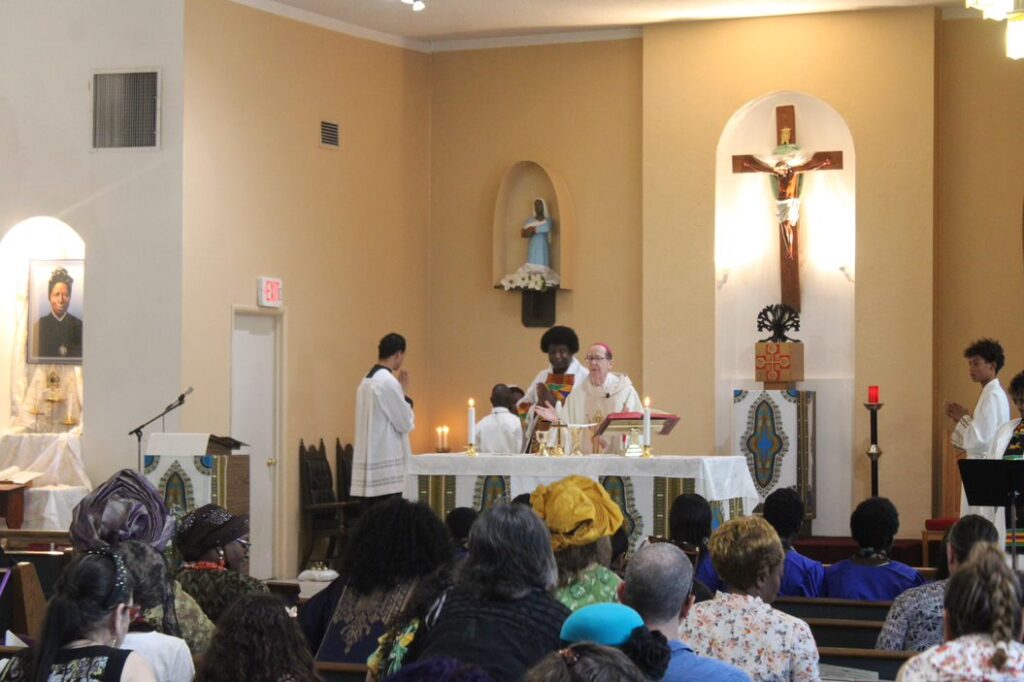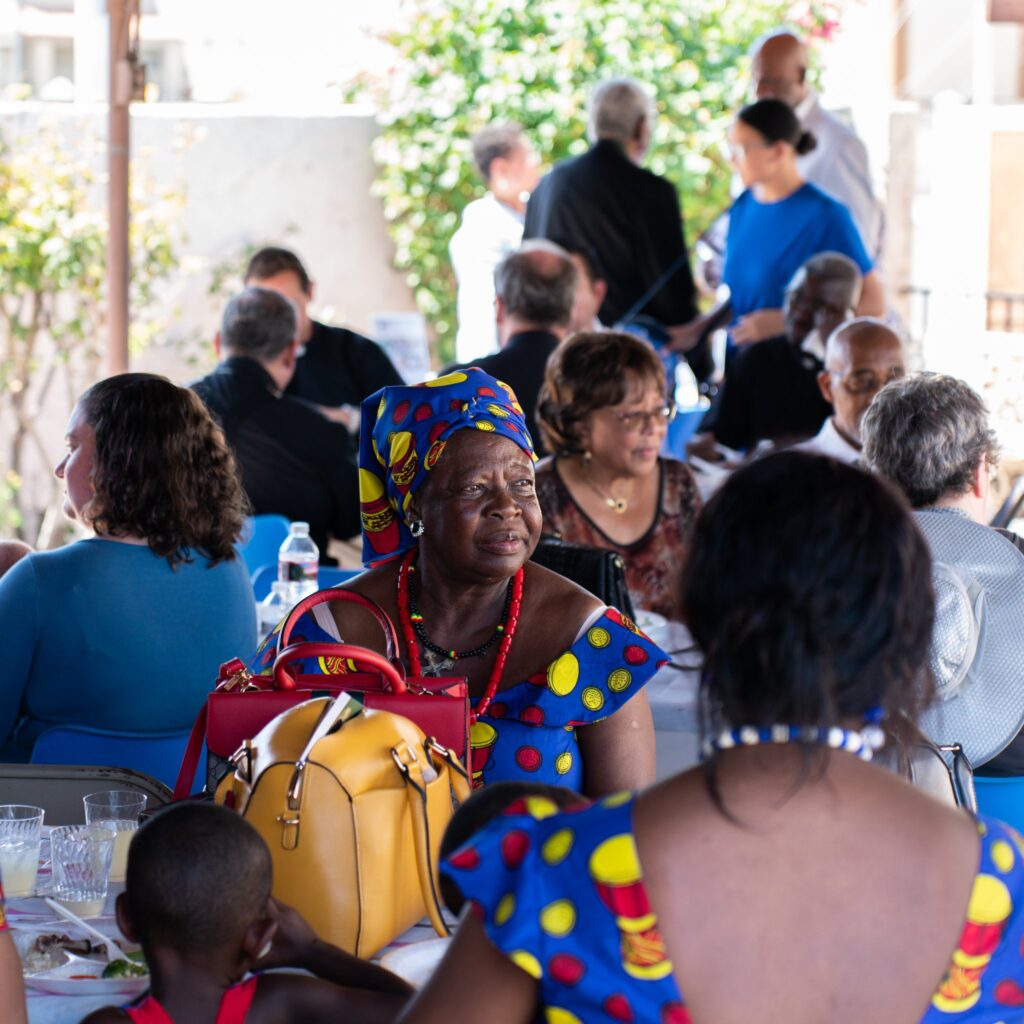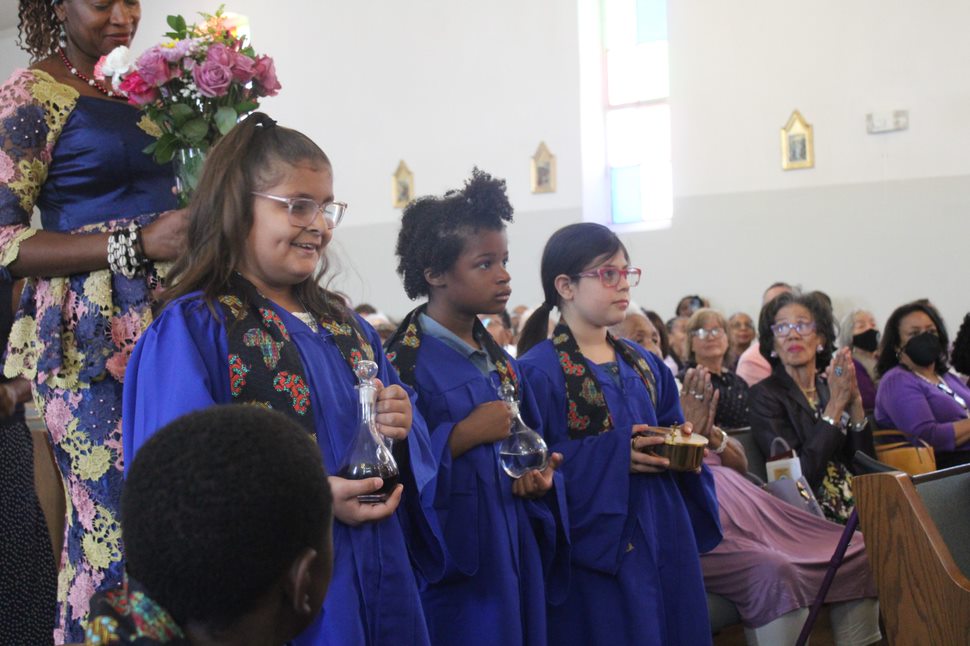
Just as the Jewish people wandered in the desert for 40 years, so had the Black Catholic community of the Diocese of Phoenix before then Bishop Thomas J. Olmsted formally erected St. Josephine Mission Parish in June of last year. One year later, the community celebrated its Founders Day — the Solemnity of the Founding of a Parish on June 11.
“We all need some place to call home. The People of God wandered and were searching to arrive to their home, the Promised Land,” said pastor Fr. Andrew McNair in his homily. “And, my brothers and sisters, my heart is filled with so much joy because we, the People of God, we have found a home, and it’s called St. Josephine Bakhita. Thank you, Jesus.”
According to the “Universal Norms on the Liturgical Year and the General Roman Calendar,” the anniversary of the dedication of a church is considered a solemnity for that community (59.I.4.b), and it can be moved to the nearest Sunday for the “pastoral good of the faithful” (58). “Founders Day” celebrations also maintain a deep significance in the Black Church in the United States.
The announcement that the parish would be established came June 26 of last year, and the community celebrated its inaugural Mass on Aug. 7.
In his homily, Fr. McNair recalled being a seminarian in Rome and listening to St. John Paul II preach on the importance of using culture to proclaim the faith.
“I told my fellow seminarians: ‘I pray and hope that one day I will be in a sacred place — a church — that appreciates my spirituality, my African American song and dance, that appreciates all that I am and to share the gift of Blackness with the Church,’” he said. “My fellow seminarians said to me, ‘Well, good luck with that. Good luck with that.’ Well, Church, the vision, the dream, is now a reality.”
The day also marked the Solemnity of the Body and Blood of Christ, a fact not lost on the community. The pastor emphasized the need the need to rely on the gift of the Eucharist.
“Jesus invites each one of us with the gift of our spirituality, with the gift of our culture, with the gift that all we are to nourish ourselves, to strengthen ourselves, to better ourselves with His Body and Blood, which is the gift of the Eucharist,” said Fr. McNair. “Although we are many, of different backgrounds, different cultures, different traditions, we share as the people of God the One Bread, the One Body that is Jesus Christ, our Lord. In Him, we find our oneness.”
In remarks at the end of the Mass, Bishop Olmsted — who celebrated the liturgy — recalled being impressed by Fr. McNair’s writings and first inviting him to preach at the annual Rev. Dr. Martin Luther King, Jr., Mass a little more than 10 years ago.
“Right away, I was struck by his clear insights, his convictions, his courage and the level of real-life faith that came through the article,” the bishop emeritus said. “Through that, we got to know each other, and thanks be to God, that’s led to his coming to serve here in the Diocese of Phoenix.”
Reflecting on the need to establish a personal parish for the Black Catholic community during his tenure, Bishop Olmsted said it was important to have a faithful pastor who could speak to that culture.
“We’ve been hoping to do this for a long time but we knew we had to have the right pastor who would understand the needs of the culture but also who could preach and teach and unite them. That’s what we saw today — such a celebration,” he said. “John Paul II really believed that inculturation was a sign that the faith has become part of the people’s hearts, minds and their lives as a family. Culture was crucial for their own identity and, especially, their identity in Christ.”
Gerald and Ireloa Onwukeme — along with their three children — attended St. Josephine for the first time during the Founders Day celebration, which they learned about through the Igbo Community Association of Arizona. Ireloa said her family — which typically attends St. Juan Diego Church in Chandler — plans to worship at St. Josephine more regularly.
“They love it. They feel so comfortable here,” she said of her children. “They see themselves in the mirror, and to see other people that look like them in a supportive Catholic foundation is very important for them.”
Third-year seminarian Jacob Barnett — who is originally from St. Helen Parish in Glendale — served as the master of ceremonies for the liturgy. Coming from a biracial family — a white mother and Black father —, said he’s appreciated being able to serve at a traditionally Black parish for his summer assignment.
“It’s been really meaningful just to be able to connect with my Black half,” he said. “The parish has a really fitting motto: ‘All are welcomed. All are loved.’ I’ve definitely felt that. Just to have that love for the people and then have them love you back has been really affirming.”
Barnett will be in the first class of seminarians to live out their Spirituality Year at Our Lady of Perpetual Help House, in Scottsdale during the coming academic year. During his time serving at the parish, Barnett has also developed a devotion to St. Josephine Bakhita.
“I had heard her name a couple of times,” he said. “Something great that Fr. McNair is doing is fostering devotion to St. Josephine, through the prayer of the litany and then just having the relic here has been really inspirational.”
The celebration also saw the premiere of the Umoja Youth Choir, led by Keristiane Dugar. “Umoja” is the Swahili word for “unity.” The choir featured children from multiple backgrounds singing in the Afrocentric Gospel tradition.
“Even though it’s Afrocentric, we still like to be diverse to let everyone know that they’re welcome no matter what race or what color,” said Dugar. “The youth are our future, so, it’s important to have younger people join the choir in order for the tradition to continue.”
Dawn Board, who served as chairwoman for the committee planning the Founders Day celebration and also serves as the parish’s youth coordinator, expressed appreciation for the hard work of everybody involved. She also emphasized the importance of getting the youth involved, such as through the Umoja Youth Choir.
“We are definitely executing the vision of Fr. McNair, which is really investing in our kids now so that we keep them and have that personal relationship with God through Catholicism and through their culture,” she said.
National and regional leaders from the Knights and Ladies of Peter Claver — the only traditionally African-American Catholic fraternal society — attended the celebration. Darrell Dickerson, who serves as district deputy for the Knights in the Western States District, expressed appreciation for the welcome he felt at the celebration.
“As Father mentioned that this is home, and it felt like home to me,” he said. “Being a visitor for the first time, I felt at home.”
Supreme Lady Micaela Le Blanc expressed her appreciation for how much the community has grown since it was re-established as a ministry in the 1990s and the church was called St. Pius X. Having recently had the opportunity to meet Pope Francis, she noted how the community is carrying on the Holy Father’s message.
“I remember when it was the mission, and they met monthly. Now they are a thriving community with families and children, and it’s just wonderful to see,” she said. Added Le Blanc, Pope Francis “is emphasizing exactly what’s going on here at St. Josephine Bakhita Parish, and that is bringing the family together. Keeping families together and bringing them back to church is what’s going to sustain our religion, our society and our world.”
Beginning Sunday, Aug. 27 of this year, the weekly Sunday Gospel Mass will be celebrated at 11 a.m. at St. Josephine Bakhita parish.








